Principles of Financial Literacy: Initiatives and Impact Analysis
VerifiedAdded on 2019/09/19
|14
|3384
|75
Report
AI Summary
This report delves into the crucial principles of financial literacy, emphasizing the ability to understand and manage money effectively. It explores the importance of financial education, capacity building, and the design of financial programs, highlighting key principles developed by the OECD an...
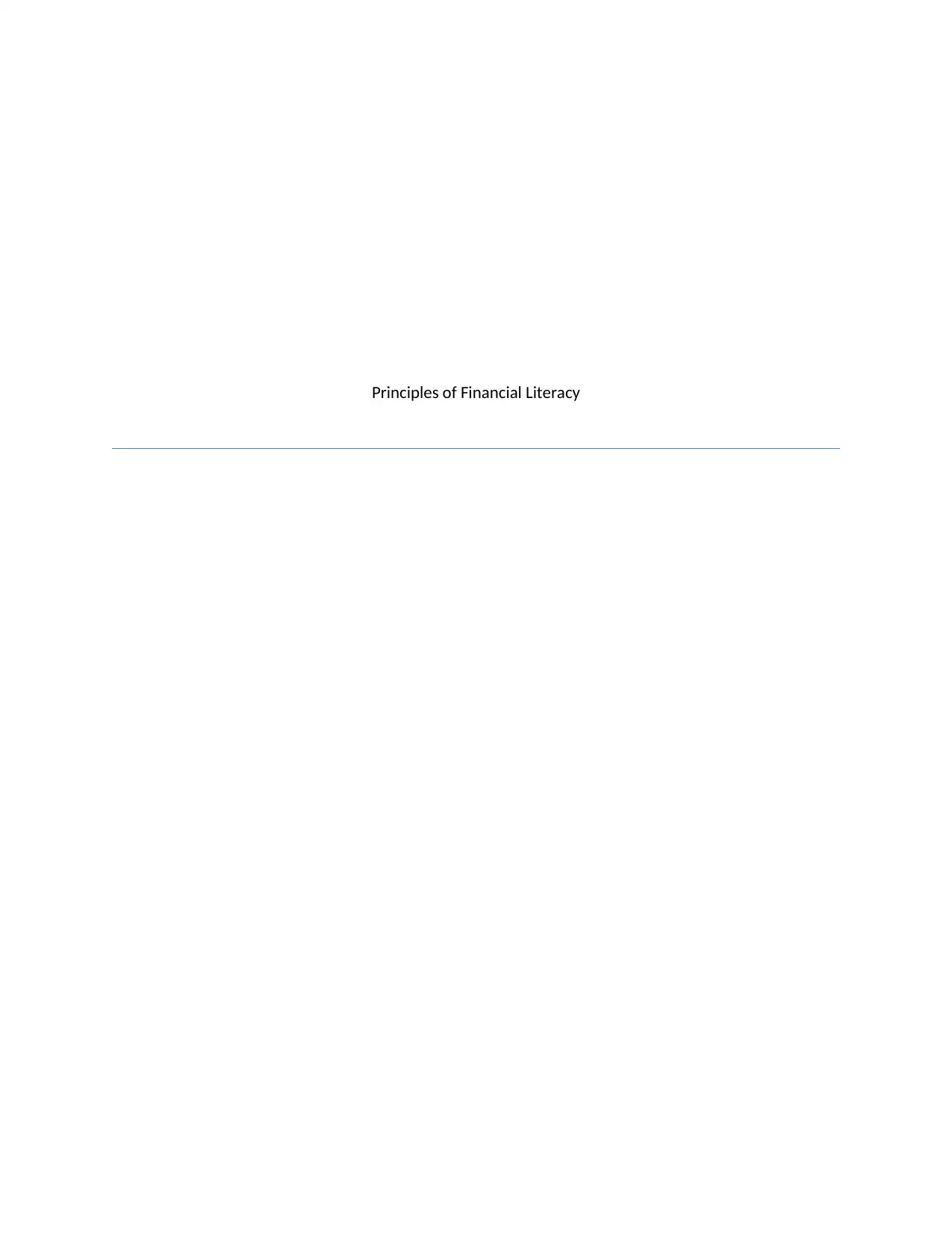
Principles of Financial Literacy
Paraphrase This Document
Need a fresh take? Get an instant paraphrase of this document with our AI Paraphraser
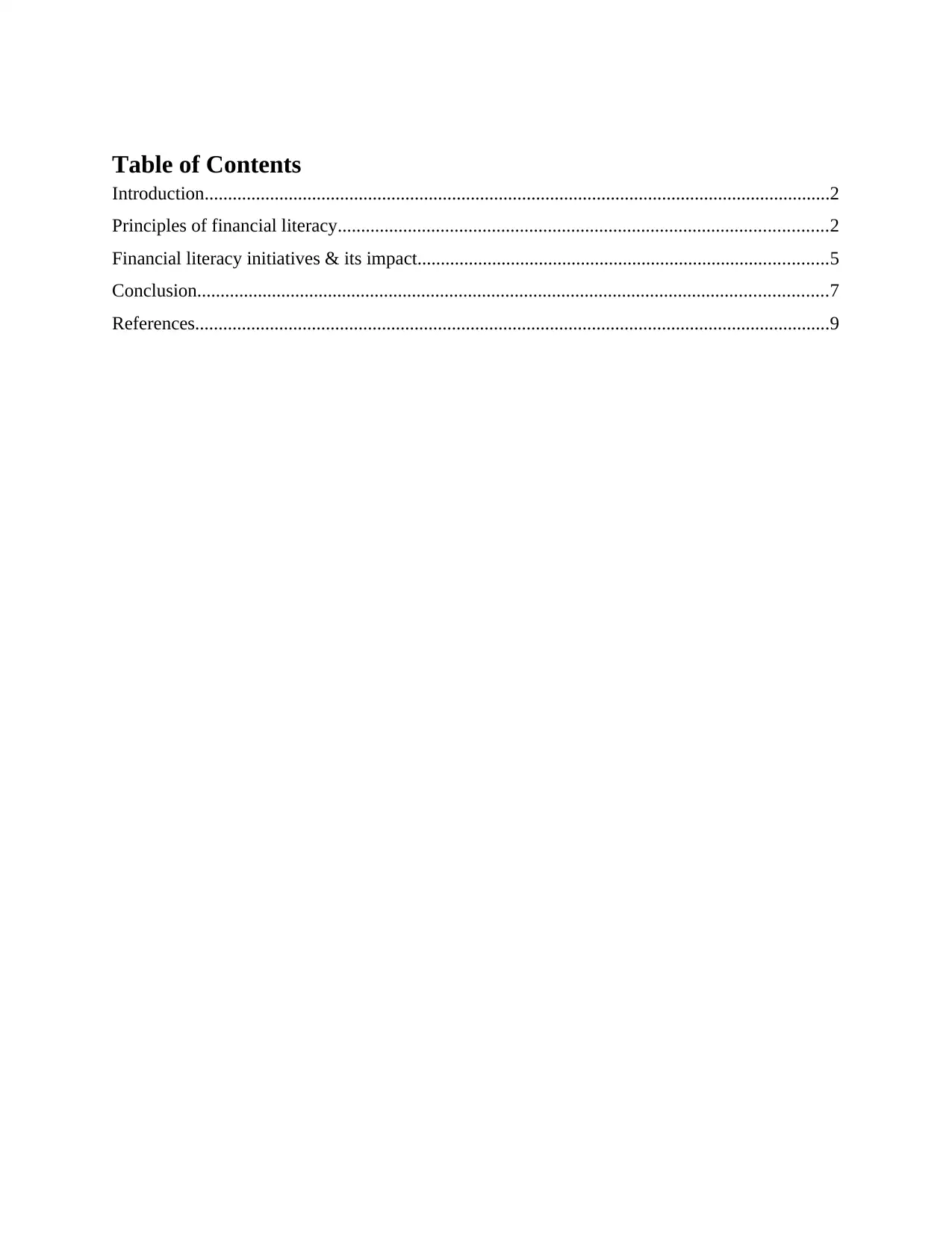
Table of Contents
Introduction......................................................................................................................................2
Principles of financial literacy.........................................................................................................2
Financial literacy initiatives & its impact........................................................................................5
Conclusion.......................................................................................................................................7
References........................................................................................................................................9
Introduction......................................................................................................................................2
Principles of financial literacy.........................................................................................................2
Financial literacy initiatives & its impact........................................................................................5
Conclusion.......................................................................................................................................7
References........................................................................................................................................9
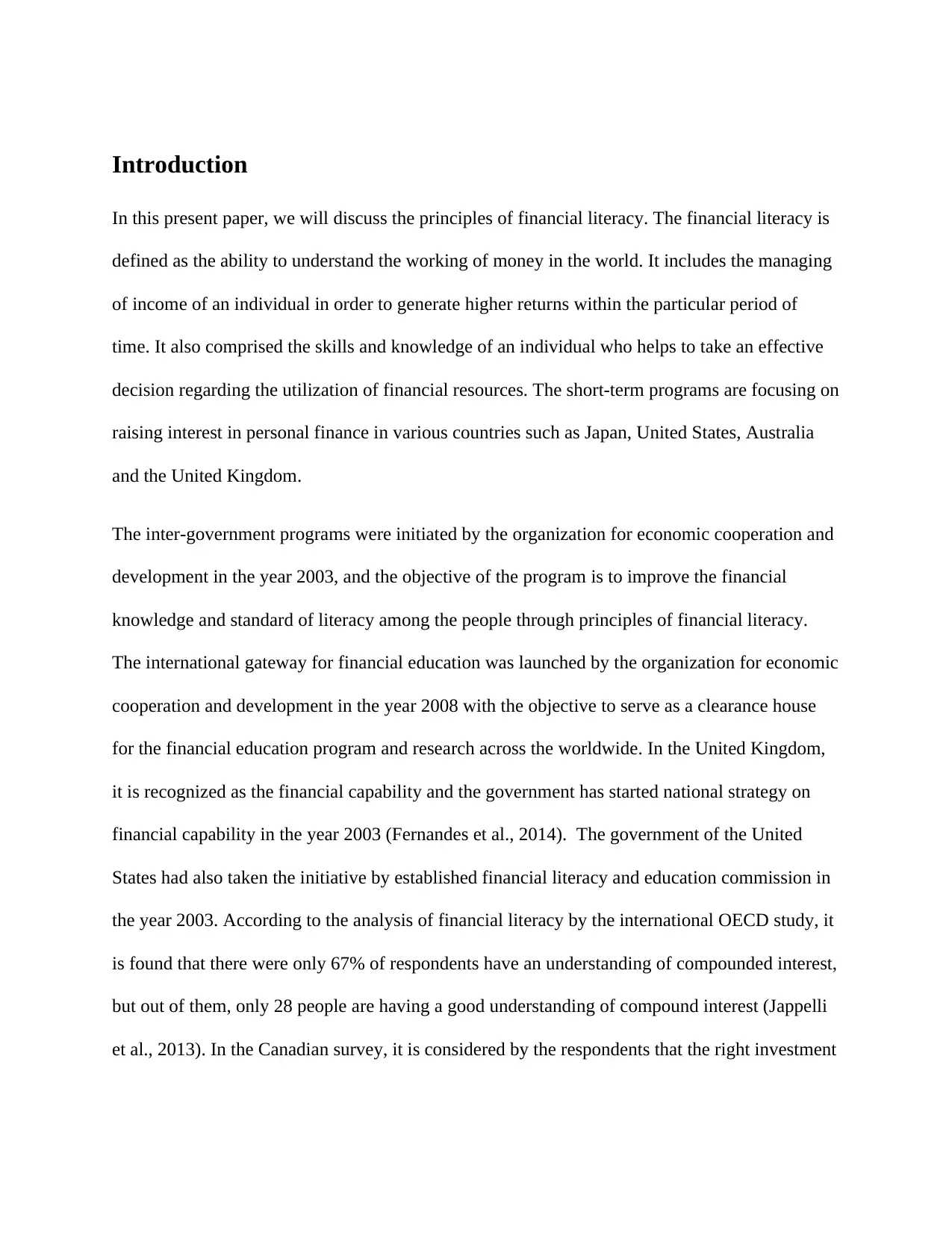
Introduction
In this present paper, we will discuss the principles of financial literacy. The financial literacy is
defined as the ability to understand the working of money in the world. It includes the managing
of income of an individual in order to generate higher returns within the particular period of
time. It also comprised the skills and knowledge of an individual who helps to take an effective
decision regarding the utilization of financial resources. The short-term programs are focusing on
raising interest in personal finance in various countries such as Japan, United States, Australia
and the United Kingdom.
The inter-government programs were initiated by the organization for economic cooperation and
development in the year 2003, and the objective of the program is to improve the financial
knowledge and standard of literacy among the people through principles of financial literacy.
The international gateway for financial education was launched by the organization for economic
cooperation and development in the year 2008 with the objective to serve as a clearance house
for the financial education program and research across the worldwide. In the United Kingdom,
it is recognized as the financial capability and the government has started national strategy on
financial capability in the year 2003 (Fernandes et al., 2014). The government of the United
States had also taken the initiative by established financial literacy and education commission in
the year 2003. According to the analysis of financial literacy by the international OECD study, it
is found that there were only 67% of respondents have an understanding of compounded interest,
but out of them, only 28 people are having a good understanding of compound interest (Jappelli
et al., 2013). In the Canadian survey, it is considered by the respondents that the right investment
In this present paper, we will discuss the principles of financial literacy. The financial literacy is
defined as the ability to understand the working of money in the world. It includes the managing
of income of an individual in order to generate higher returns within the particular period of
time. It also comprised the skills and knowledge of an individual who helps to take an effective
decision regarding the utilization of financial resources. The short-term programs are focusing on
raising interest in personal finance in various countries such as Japan, United States, Australia
and the United Kingdom.
The inter-government programs were initiated by the organization for economic cooperation and
development in the year 2003, and the objective of the program is to improve the financial
knowledge and standard of literacy among the people through principles of financial literacy.
The international gateway for financial education was launched by the organization for economic
cooperation and development in the year 2008 with the objective to serve as a clearance house
for the financial education program and research across the worldwide. In the United Kingdom,
it is recognized as the financial capability and the government has started national strategy on
financial capability in the year 2003 (Fernandes et al., 2014). The government of the United
States had also taken the initiative by established financial literacy and education commission in
the year 2003. According to the analysis of financial literacy by the international OECD study, it
is found that there were only 67% of respondents have an understanding of compounded interest,
but out of them, only 28 people are having a good understanding of compound interest (Jappelli
et al., 2013). In the Canadian survey, it is considered by the respondents that the right investment
You're viewing a preview
Unlock full access by subscribing today!
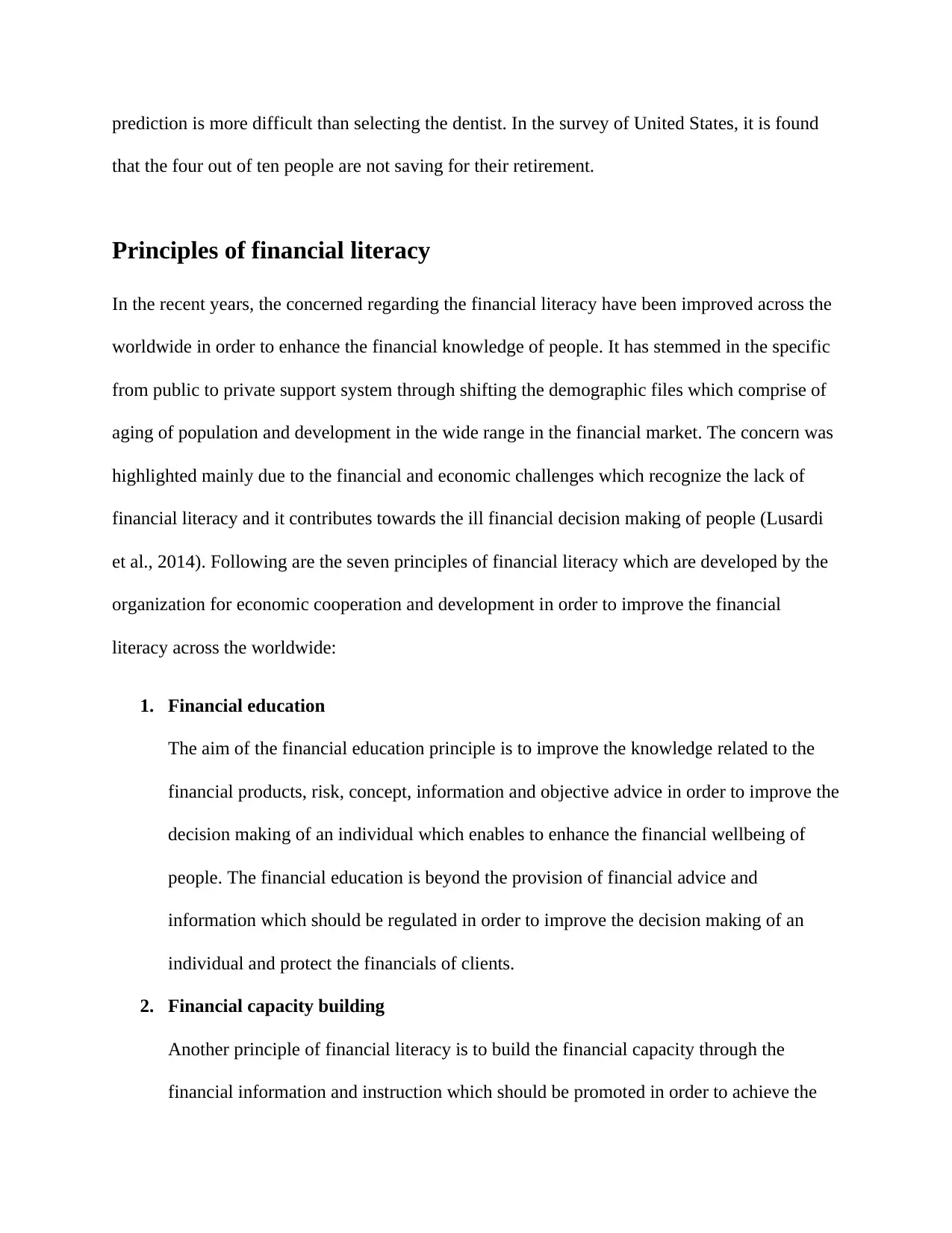
prediction is more difficult than selecting the dentist. In the survey of United States, it is found
that the four out of ten people are not saving for their retirement.
Principles of financial literacy
In the recent years, the concerned regarding the financial literacy have been improved across the
worldwide in order to enhance the financial knowledge of people. It has stemmed in the specific
from public to private support system through shifting the demographic files which comprise of
aging of population and development in the wide range in the financial market. The concern was
highlighted mainly due to the financial and economic challenges which recognize the lack of
financial literacy and it contributes towards the ill financial decision making of people (Lusardi
et al., 2014). Following are the seven principles of financial literacy which are developed by the
organization for economic cooperation and development in order to improve the financial
literacy across the worldwide:
1. Financial education
The aim of the financial education principle is to improve the knowledge related to the
financial products, risk, concept, information and objective advice in order to improve the
decision making of an individual which enables to enhance the financial wellbeing of
people. The financial education is beyond the provision of financial advice and
information which should be regulated in order to improve the decision making of an
individual and protect the financials of clients.
2. Financial capacity building
Another principle of financial literacy is to build the financial capacity through the
financial information and instruction which should be promoted in order to achieve the
that the four out of ten people are not saving for their retirement.
Principles of financial literacy
In the recent years, the concerned regarding the financial literacy have been improved across the
worldwide in order to enhance the financial knowledge of people. It has stemmed in the specific
from public to private support system through shifting the demographic files which comprise of
aging of population and development in the wide range in the financial market. The concern was
highlighted mainly due to the financial and economic challenges which recognize the lack of
financial literacy and it contributes towards the ill financial decision making of people (Lusardi
et al., 2014). Following are the seven principles of financial literacy which are developed by the
organization for economic cooperation and development in order to improve the financial
literacy across the worldwide:
1. Financial education
The aim of the financial education principle is to improve the knowledge related to the
financial products, risk, concept, information and objective advice in order to improve the
decision making of an individual which enables to enhance the financial wellbeing of
people. The financial education is beyond the provision of financial advice and
information which should be regulated in order to improve the decision making of an
individual and protect the financials of clients.
2. Financial capacity building
Another principle of financial literacy is to build the financial capacity through the
financial information and instruction which should be promoted in order to achieve the
Paraphrase This Document
Need a fresh take? Get an instant paraphrase of this document with our AI Paraphraser
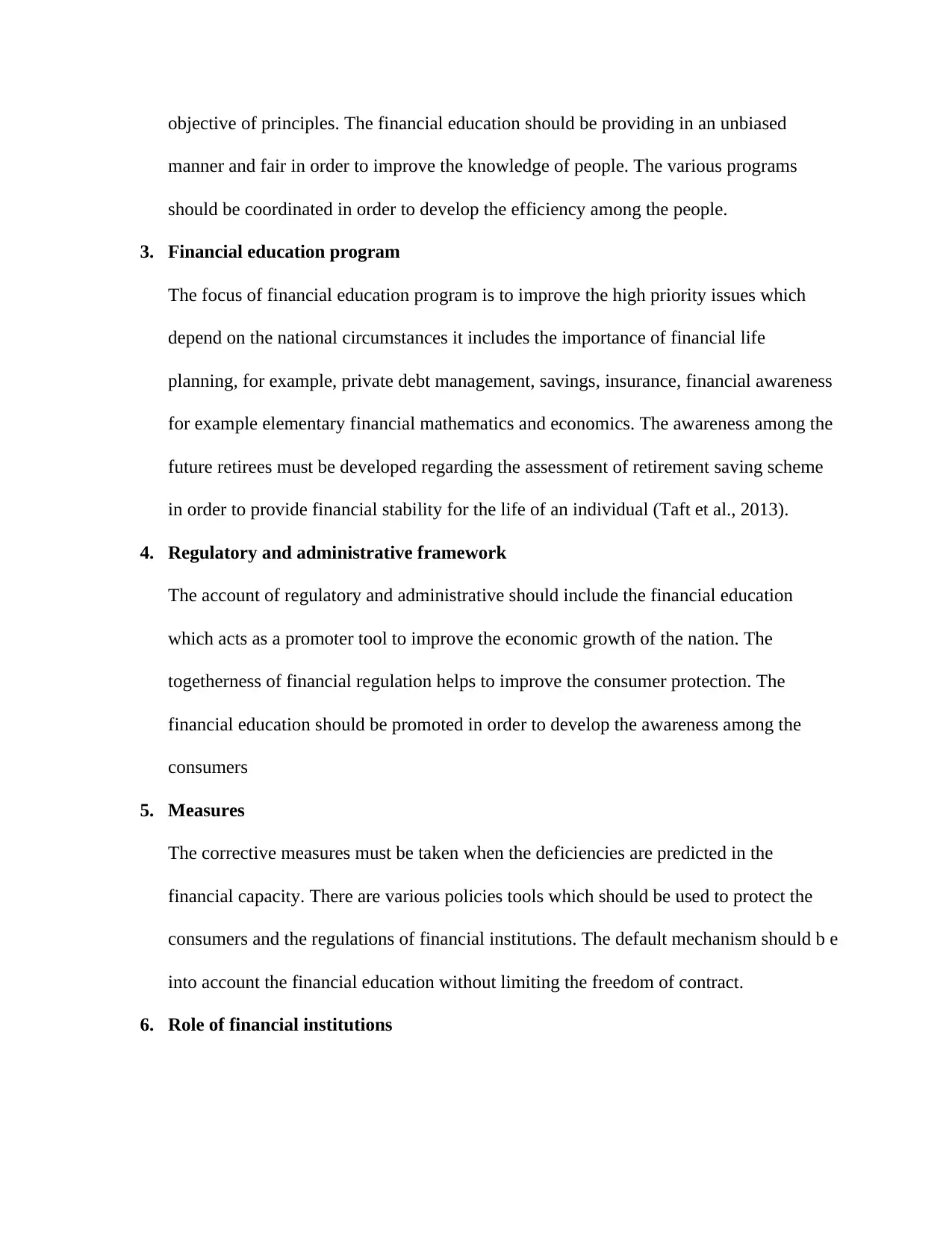
objective of principles. The financial education should be providing in an unbiased
manner and fair in order to improve the knowledge of people. The various programs
should be coordinated in order to develop the efficiency among the people.
3. Financial education program
The focus of financial education program is to improve the high priority issues which
depend on the national circumstances it includes the importance of financial life
planning, for example, private debt management, savings, insurance, financial awareness
for example elementary financial mathematics and economics. The awareness among the
future retirees must be developed regarding the assessment of retirement saving scheme
in order to provide financial stability for the life of an individual (Taft et al., 2013).
4. Regulatory and administrative framework
The account of regulatory and administrative should include the financial education
which acts as a promoter tool to improve the economic growth of the nation. The
togetherness of financial regulation helps to improve the consumer protection. The
financial education should be promoted in order to develop the awareness among the
consumers
5. Measures
The corrective measures must be taken when the deficiencies are predicted in the
financial capacity. There are various policies tools which should be used to protect the
consumers and the regulations of financial institutions. The default mechanism should b e
into account the financial education without limiting the freedom of contract.
6. Role of financial institutions
manner and fair in order to improve the knowledge of people. The various programs
should be coordinated in order to develop the efficiency among the people.
3. Financial education program
The focus of financial education program is to improve the high priority issues which
depend on the national circumstances it includes the importance of financial life
planning, for example, private debt management, savings, insurance, financial awareness
for example elementary financial mathematics and economics. The awareness among the
future retirees must be developed regarding the assessment of retirement saving scheme
in order to provide financial stability for the life of an individual (Taft et al., 2013).
4. Regulatory and administrative framework
The account of regulatory and administrative should include the financial education
which acts as a promoter tool to improve the economic growth of the nation. The
togetherness of financial regulation helps to improve the consumer protection. The
financial education should be promoted in order to develop the awareness among the
consumers
5. Measures
The corrective measures must be taken when the deficiencies are predicted in the
financial capacity. There are various policies tools which should be used to protect the
consumers and the regulations of financial institutions. The default mechanism should b e
into account the financial education without limiting the freedom of contract.
6. Role of financial institutions
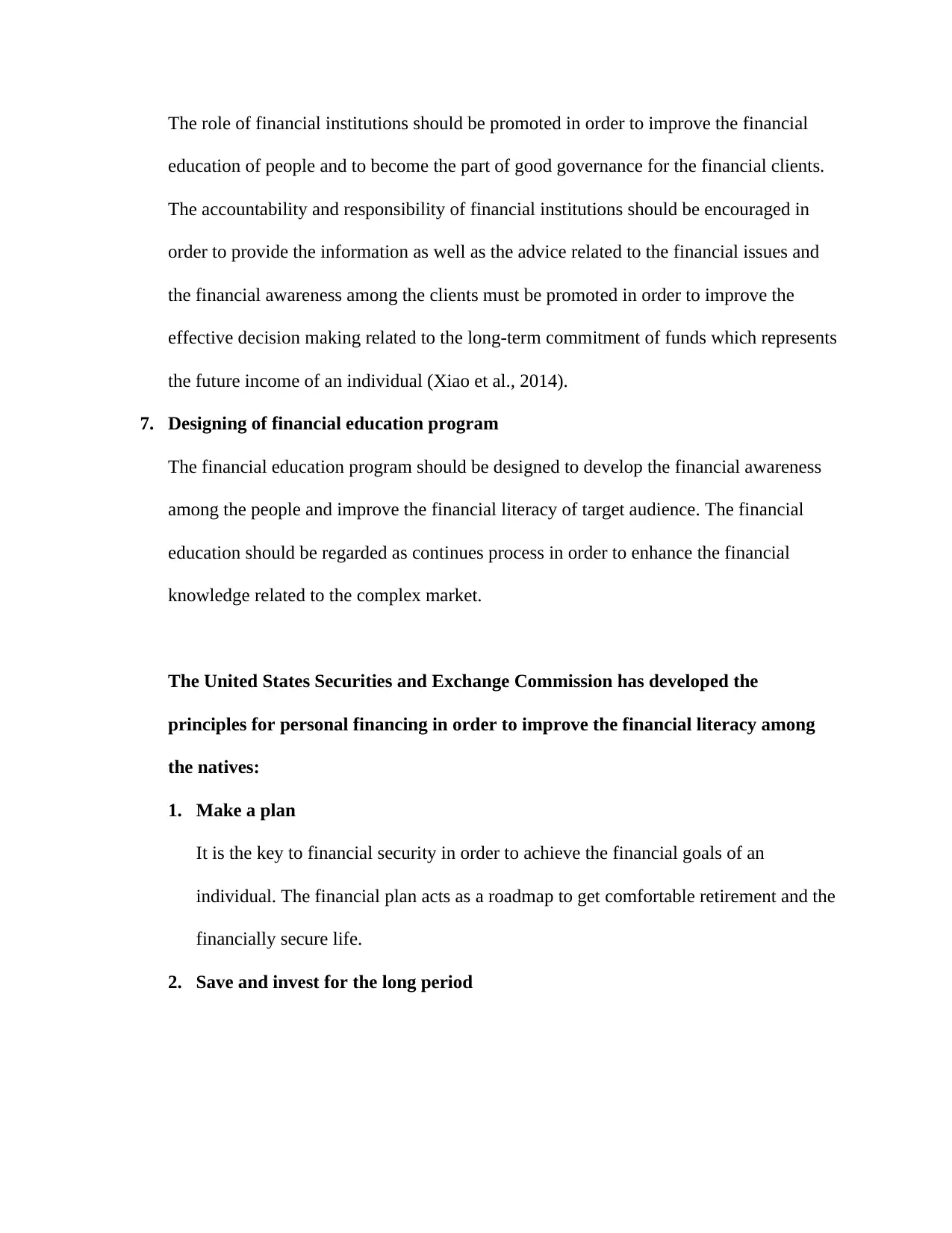
The role of financial institutions should be promoted in order to improve the financial
education of people and to become the part of good governance for the financial clients.
The accountability and responsibility of financial institutions should be encouraged in
order to provide the information as well as the advice related to the financial issues and
the financial awareness among the clients must be promoted in order to improve the
effective decision making related to the long-term commitment of funds which represents
the future income of an individual (Xiao et al., 2014).
7. Designing of financial education program
The financial education program should be designed to develop the financial awareness
among the people and improve the financial literacy of target audience. The financial
education should be regarded as continues process in order to enhance the financial
knowledge related to the complex market.
The United States Securities and Exchange Commission has developed the
principles for personal financing in order to improve the financial literacy among
the natives:
1. Make a plan
It is the key to financial security in order to achieve the financial goals of an
individual. The financial plan acts as a roadmap to get comfortable retirement and the
financially secure life.
2. Save and invest for the long period
education of people and to become the part of good governance for the financial clients.
The accountability and responsibility of financial institutions should be encouraged in
order to provide the information as well as the advice related to the financial issues and
the financial awareness among the clients must be promoted in order to improve the
effective decision making related to the long-term commitment of funds which represents
the future income of an individual (Xiao et al., 2014).
7. Designing of financial education program
The financial education program should be designed to develop the financial awareness
among the people and improve the financial literacy of target audience. The financial
education should be regarded as continues process in order to enhance the financial
knowledge related to the complex market.
The United States Securities and Exchange Commission has developed the
principles for personal financing in order to improve the financial literacy among
the natives:
1. Make a plan
It is the key to financial security in order to achieve the financial goals of an
individual. The financial plan acts as a roadmap to get comfortable retirement and the
financially secure life.
2. Save and invest for the long period
You're viewing a preview
Unlock full access by subscribing today!
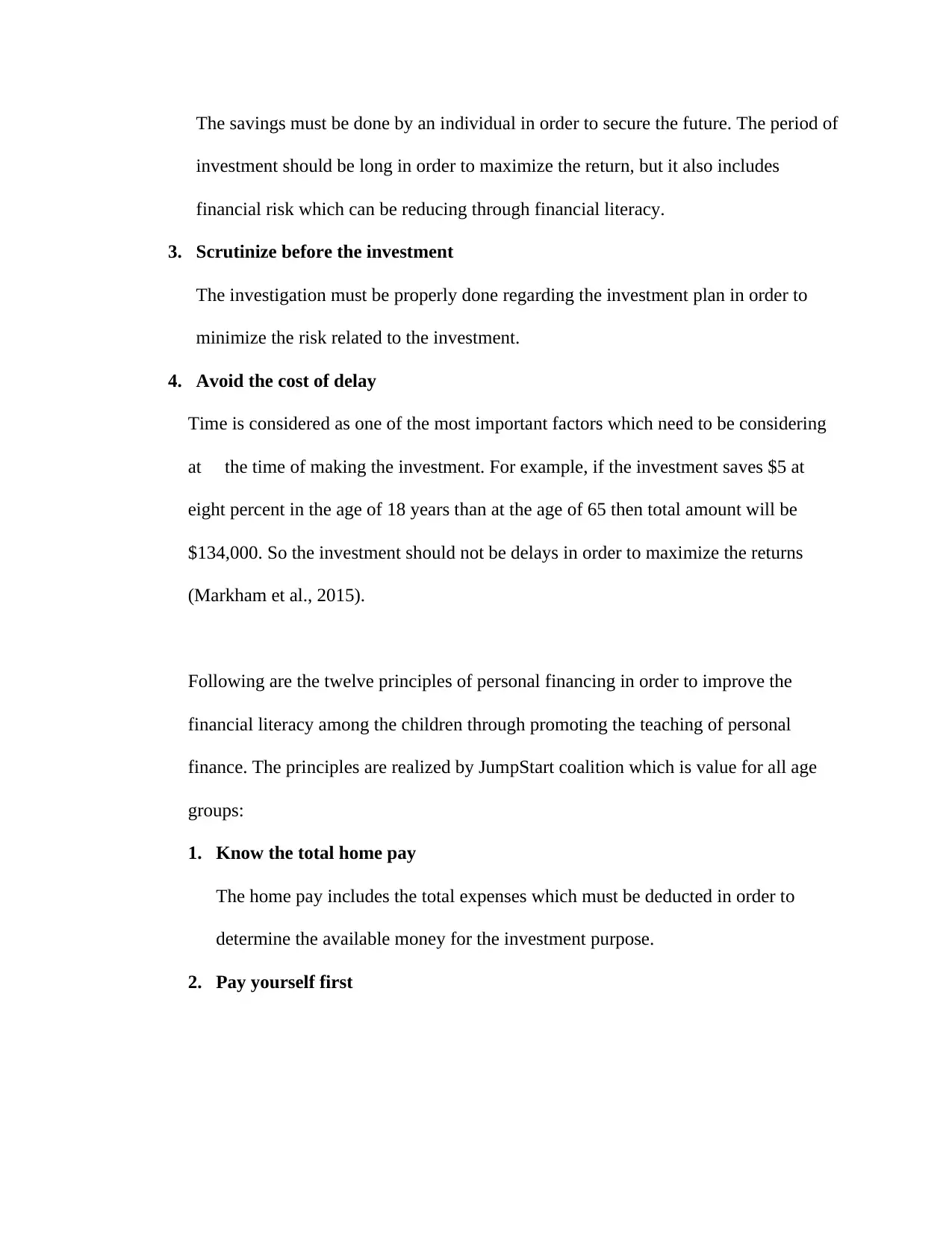
The savings must be done by an individual in order to secure the future. The period of
investment should be long in order to maximize the return, but it also includes
financial risk which can be reducing through financial literacy.
3. Scrutinize before the investment
The investigation must be properly done regarding the investment plan in order to
minimize the risk related to the investment.
4. Avoid the cost of delay
Time is considered as one of the most important factors which need to be considering
at the time of making the investment. For example, if the investment saves $5 at
eight percent in the age of 18 years than at the age of 65 then total amount will be
$134,000. So the investment should not be delays in order to maximize the returns
(Markham et al., 2015).
Following are the twelve principles of personal financing in order to improve the
financial literacy among the children through promoting the teaching of personal
finance. The principles are realized by JumpStart coalition which is value for all age
groups:
1. Know the total home pay
The home pay includes the total expenses which must be deducted in order to
determine the available money for the investment purpose.
2. Pay yourself first
investment should be long in order to maximize the return, but it also includes
financial risk which can be reducing through financial literacy.
3. Scrutinize before the investment
The investigation must be properly done regarding the investment plan in order to
minimize the risk related to the investment.
4. Avoid the cost of delay
Time is considered as one of the most important factors which need to be considering
at the time of making the investment. For example, if the investment saves $5 at
eight percent in the age of 18 years than at the age of 65 then total amount will be
$134,000. So the investment should not be delays in order to maximize the returns
(Markham et al., 2015).
Following are the twelve principles of personal financing in order to improve the
financial literacy among the children through promoting the teaching of personal
finance. The principles are realized by JumpStart coalition which is value for all age
groups:
1. Know the total home pay
The home pay includes the total expenses which must be deducted in order to
determine the available money for the investment purpose.
2. Pay yourself first
Paraphrase This Document
Need a fresh take? Get an instant paraphrase of this document with our AI Paraphraser
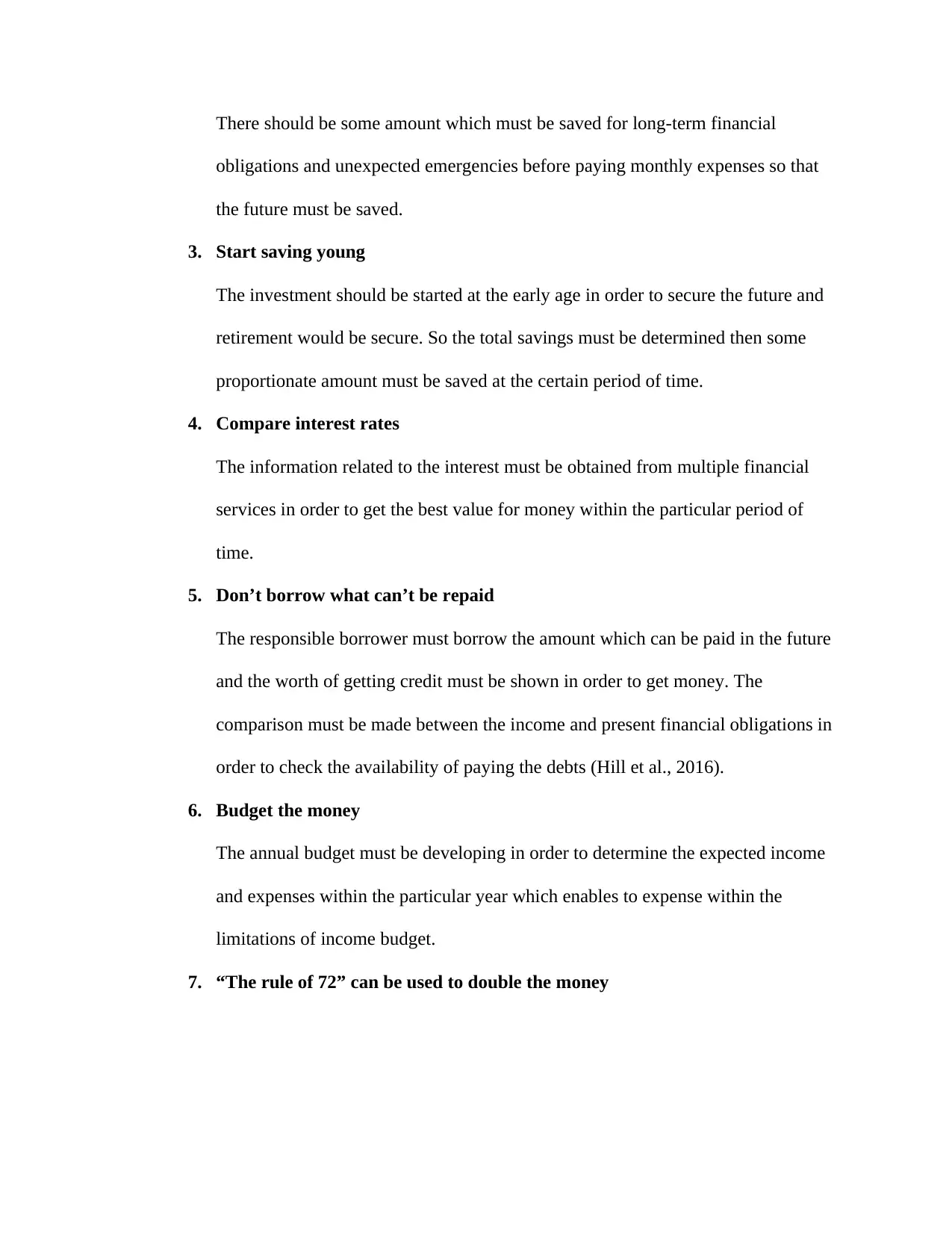
There should be some amount which must be saved for long-term financial
obligations and unexpected emergencies before paying monthly expenses so that
the future must be saved.
3. Start saving young
The investment should be started at the early age in order to secure the future and
retirement would be secure. So the total savings must be determined then some
proportionate amount must be saved at the certain period of time.
4. Compare interest rates
The information related to the interest must be obtained from multiple financial
services in order to get the best value for money within the particular period of
time.
5. Don’t borrow what can’t be repaid
The responsible borrower must borrow the amount which can be paid in the future
and the worth of getting credit must be shown in order to get money. The
comparison must be made between the income and present financial obligations in
order to check the availability of paying the debts (Hill et al., 2016).
6. Budget the money
The annual budget must be developing in order to determine the expected income
and expenses within the particular year which enables to expense within the
limitations of income budget.
7. “The rule of 72” can be used to double the money
obligations and unexpected emergencies before paying monthly expenses so that
the future must be saved.
3. Start saving young
The investment should be started at the early age in order to secure the future and
retirement would be secure. So the total savings must be determined then some
proportionate amount must be saved at the certain period of time.
4. Compare interest rates
The information related to the interest must be obtained from multiple financial
services in order to get the best value for money within the particular period of
time.
5. Don’t borrow what can’t be repaid
The responsible borrower must borrow the amount which can be paid in the future
and the worth of getting credit must be shown in order to get money. The
comparison must be made between the income and present financial obligations in
order to check the availability of paying the debts (Hill et al., 2016).
6. Budget the money
The annual budget must be developing in order to determine the expected income
and expenses within the particular year which enables to expense within the
limitations of income budget.
7. “The rule of 72” can be used to double the money
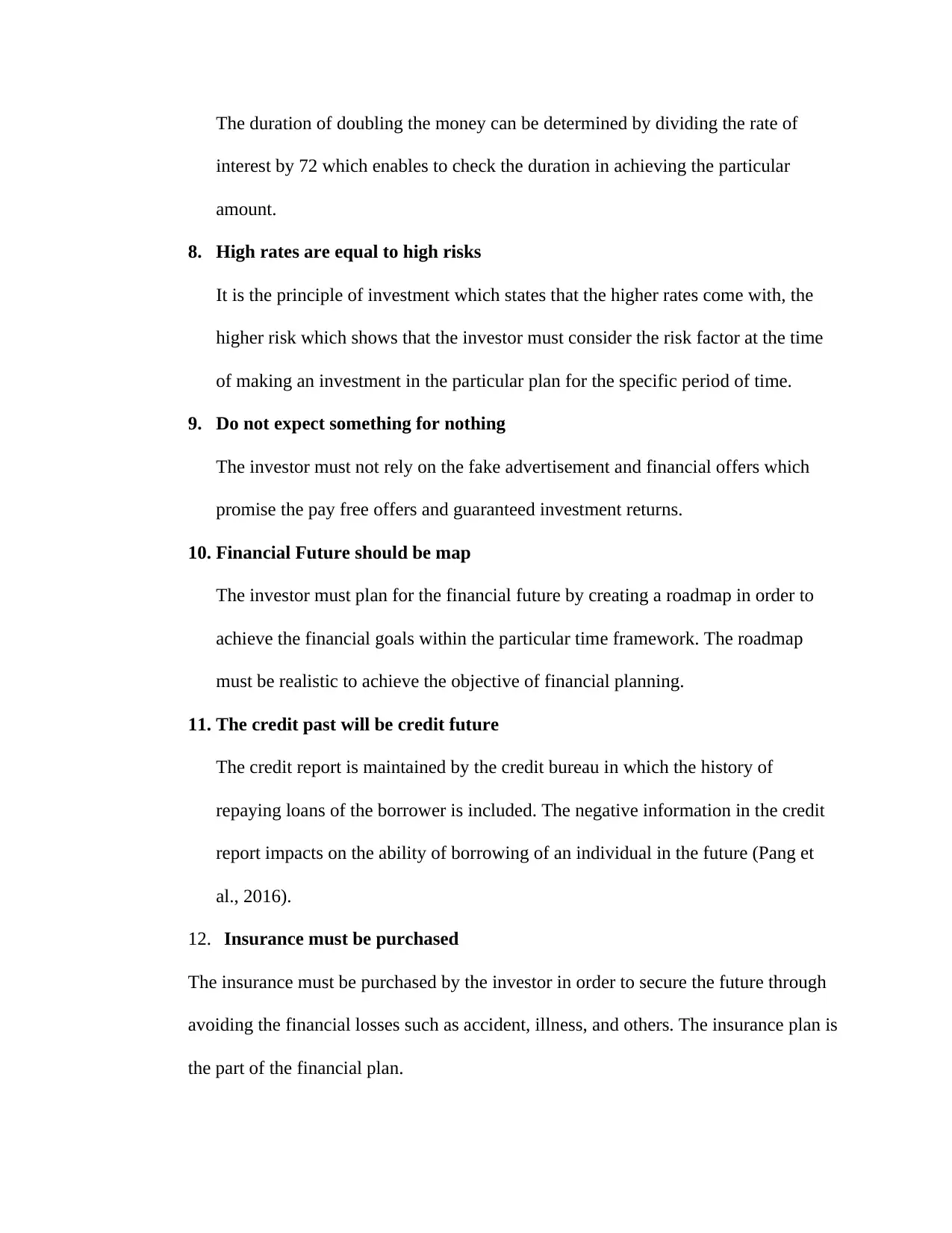
The duration of doubling the money can be determined by dividing the rate of
interest by 72 which enables to check the duration in achieving the particular
amount.
8. High rates are equal to high risks
It is the principle of investment which states that the higher rates come with, the
higher risk which shows that the investor must consider the risk factor at the time
of making an investment in the particular plan for the specific period of time.
9. Do not expect something for nothing
The investor must not rely on the fake advertisement and financial offers which
promise the pay free offers and guaranteed investment returns.
10. Financial Future should be map
The investor must plan for the financial future by creating a roadmap in order to
achieve the financial goals within the particular time framework. The roadmap
must be realistic to achieve the objective of financial planning.
11. The credit past will be credit future
The credit report is maintained by the credit bureau in which the history of
repaying loans of the borrower is included. The negative information in the credit
report impacts on the ability of borrowing of an individual in the future (Pang et
al., 2016).
12. Insurance must be purchased
The insurance must be purchased by the investor in order to secure the future through
avoiding the financial losses such as accident, illness, and others. The insurance plan is
the part of the financial plan.
interest by 72 which enables to check the duration in achieving the particular
amount.
8. High rates are equal to high risks
It is the principle of investment which states that the higher rates come with, the
higher risk which shows that the investor must consider the risk factor at the time
of making an investment in the particular plan for the specific period of time.
9. Do not expect something for nothing
The investor must not rely on the fake advertisement and financial offers which
promise the pay free offers and guaranteed investment returns.
10. Financial Future should be map
The investor must plan for the financial future by creating a roadmap in order to
achieve the financial goals within the particular time framework. The roadmap
must be realistic to achieve the objective of financial planning.
11. The credit past will be credit future
The credit report is maintained by the credit bureau in which the history of
repaying loans of the borrower is included. The negative information in the credit
report impacts on the ability of borrowing of an individual in the future (Pang et
al., 2016).
12. Insurance must be purchased
The insurance must be purchased by the investor in order to secure the future through
avoiding the financial losses such as accident, illness, and others. The insurance plan is
the part of the financial plan.
You're viewing a preview
Unlock full access by subscribing today!
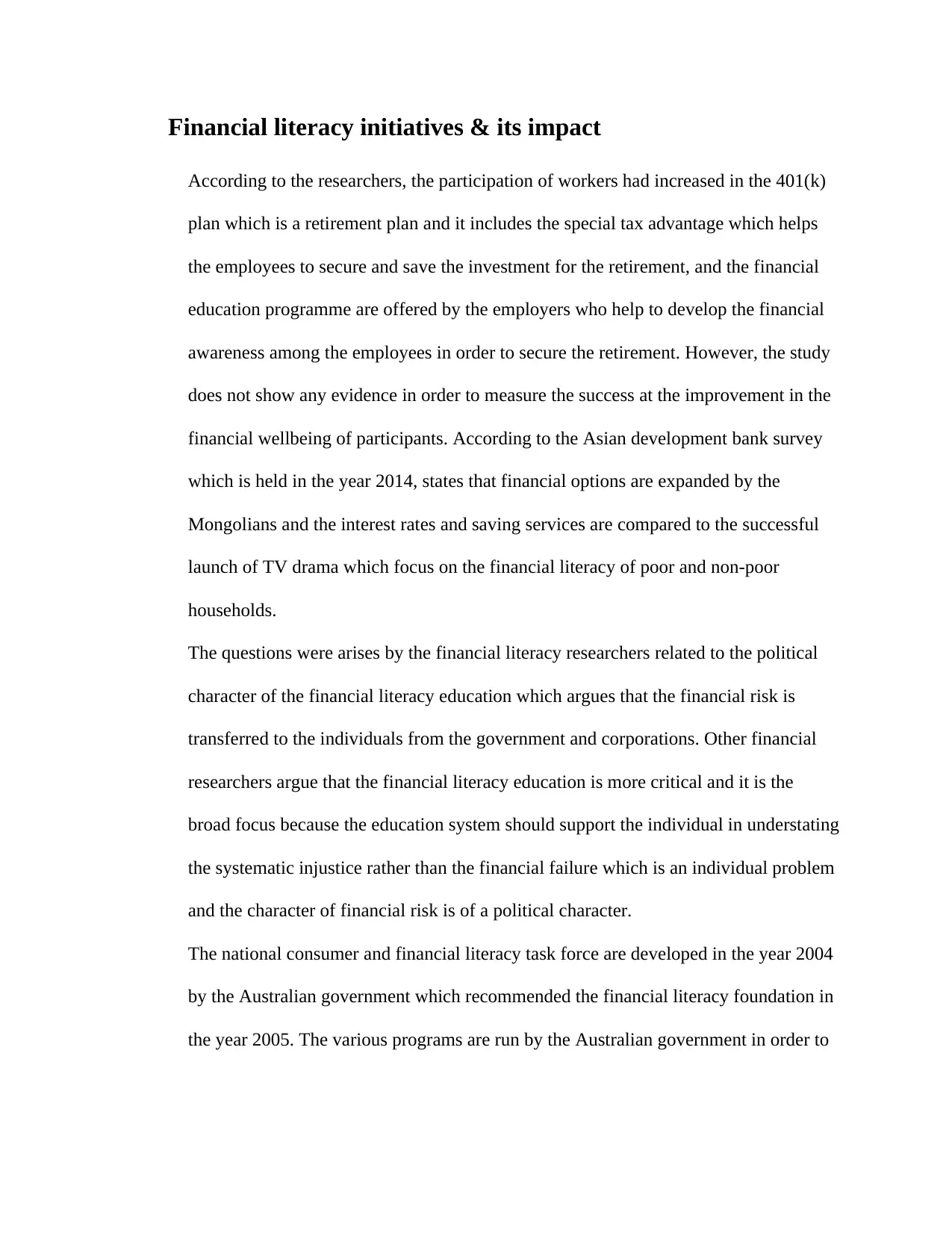
Financial literacy initiatives & its impact
According to the researchers, the participation of workers had increased in the 401(k)
plan which is a retirement plan and it includes the special tax advantage which helps
the employees to secure and save the investment for the retirement, and the financial
education programme are offered by the employers who help to develop the financial
awareness among the employees in order to secure the retirement. However, the study
does not show any evidence in order to measure the success at the improvement in the
financial wellbeing of participants. According to the Asian development bank survey
which is held in the year 2014, states that financial options are expanded by the
Mongolians and the interest rates and saving services are compared to the successful
launch of TV drama which focus on the financial literacy of poor and non-poor
households.
The questions were arises by the financial literacy researchers related to the political
character of the financial literacy education which argues that the financial risk is
transferred to the individuals from the government and corporations. Other financial
researchers argue that the financial literacy education is more critical and it is the
broad focus because the education system should support the individual in understating
the systematic injustice rather than the financial failure which is an individual problem
and the character of financial risk is of a political character.
The national consumer and financial literacy task force are developed in the year 2004
by the Australian government which recommended the financial literacy foundation in
the year 2005. The various programs are run by the Australian government in order to
According to the researchers, the participation of workers had increased in the 401(k)
plan which is a retirement plan and it includes the special tax advantage which helps
the employees to secure and save the investment for the retirement, and the financial
education programme are offered by the employers who help to develop the financial
awareness among the employees in order to secure the retirement. However, the study
does not show any evidence in order to measure the success at the improvement in the
financial wellbeing of participants. According to the Asian development bank survey
which is held in the year 2014, states that financial options are expanded by the
Mongolians and the interest rates and saving services are compared to the successful
launch of TV drama which focus on the financial literacy of poor and non-poor
households.
The questions were arises by the financial literacy researchers related to the political
character of the financial literacy education which argues that the financial risk is
transferred to the individuals from the government and corporations. Other financial
researchers argue that the financial literacy education is more critical and it is the
broad focus because the education system should support the individual in understating
the systematic injustice rather than the financial failure which is an individual problem
and the character of financial risk is of a political character.
The national consumer and financial literacy task force are developed in the year 2004
by the Australian government which recommended the financial literacy foundation in
the year 2005. The various programs are run by the Australian government in order to
Paraphrase This Document
Need a fresh take? Get an instant paraphrase of this document with our AI Paraphraser
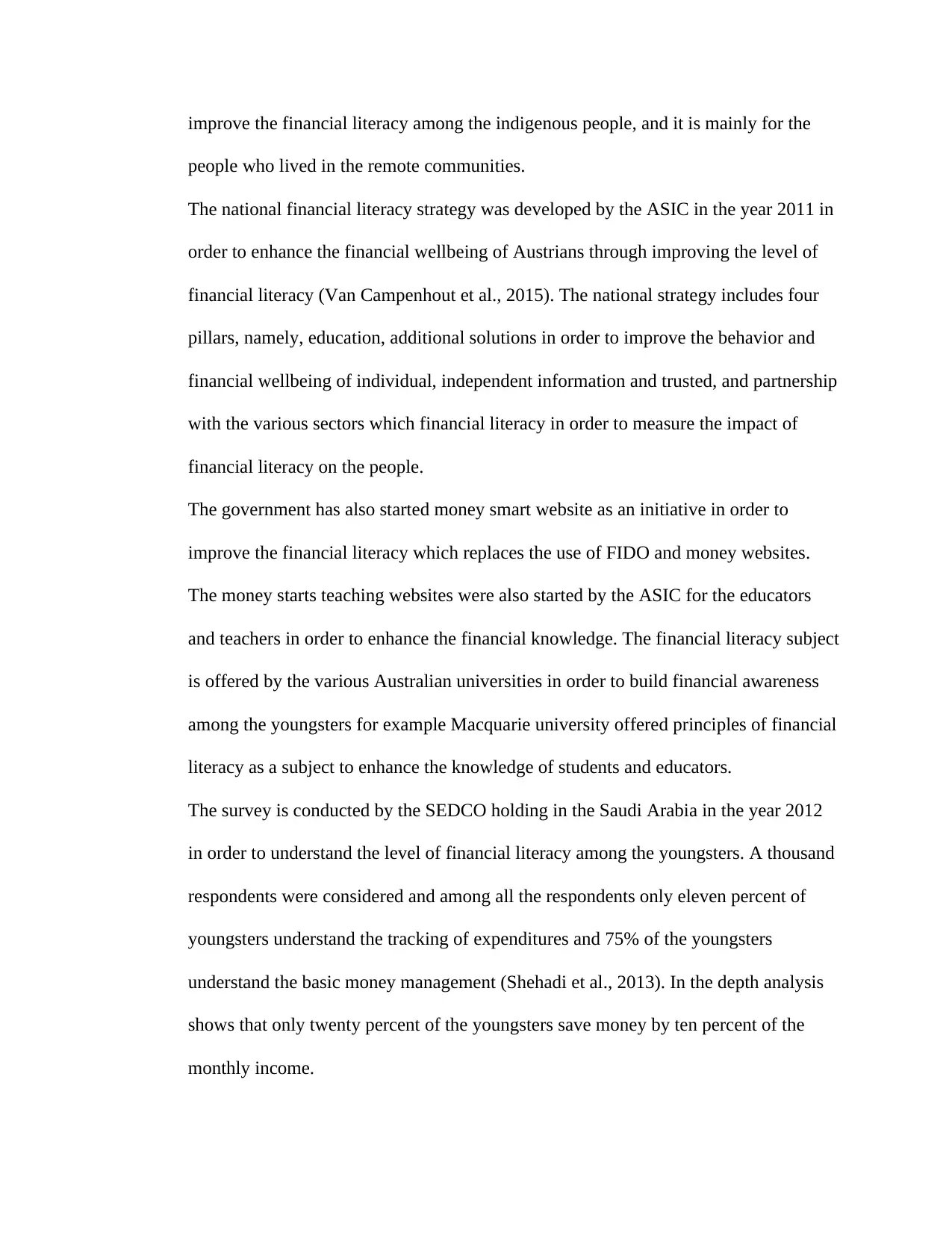
improve the financial literacy among the indigenous people, and it is mainly for the
people who lived in the remote communities.
The national financial literacy strategy was developed by the ASIC in the year 2011 in
order to enhance the financial wellbeing of Austrians through improving the level of
financial literacy (Van Campenhout et al., 2015). The national strategy includes four
pillars, namely, education, additional solutions in order to improve the behavior and
financial wellbeing of individual, independent information and trusted, and partnership
with the various sectors which financial literacy in order to measure the impact of
financial literacy on the people.
The government has also started money smart website as an initiative in order to
improve the financial literacy which replaces the use of FIDO and money websites.
The money starts teaching websites were also started by the ASIC for the educators
and teachers in order to enhance the financial knowledge. The financial literacy subject
is offered by the various Australian universities in order to build financial awareness
among the youngsters for example Macquarie university offered principles of financial
literacy as a subject to enhance the knowledge of students and educators.
The survey is conducted by the SEDCO holding in the Saudi Arabia in the year 2012
in order to understand the level of financial literacy among the youngsters. A thousand
respondents were considered and among all the respondents only eleven percent of
youngsters understand the tracking of expenditures and 75% of the youngsters
understand the basic money management (Shehadi et al., 2013). In the depth analysis
shows that only twenty percent of the youngsters save money by ten percent of the
monthly income.
people who lived in the remote communities.
The national financial literacy strategy was developed by the ASIC in the year 2011 in
order to enhance the financial wellbeing of Austrians through improving the level of
financial literacy (Van Campenhout et al., 2015). The national strategy includes four
pillars, namely, education, additional solutions in order to improve the behavior and
financial wellbeing of individual, independent information and trusted, and partnership
with the various sectors which financial literacy in order to measure the impact of
financial literacy on the people.
The government has also started money smart website as an initiative in order to
improve the financial literacy which replaces the use of FIDO and money websites.
The money starts teaching websites were also started by the ASIC for the educators
and teachers in order to enhance the financial knowledge. The financial literacy subject
is offered by the various Australian universities in order to build financial awareness
among the youngsters for example Macquarie university offered principles of financial
literacy as a subject to enhance the knowledge of students and educators.
The survey is conducted by the SEDCO holding in the Saudi Arabia in the year 2012
in order to understand the level of financial literacy among the youngsters. A thousand
respondents were considered and among all the respondents only eleven percent of
youngsters understand the tracking of expenditures and 75% of the youngsters
understand the basic money management (Shehadi et al., 2013). In the depth analysis
shows that only twenty percent of the youngsters save money by ten percent of the
monthly income.
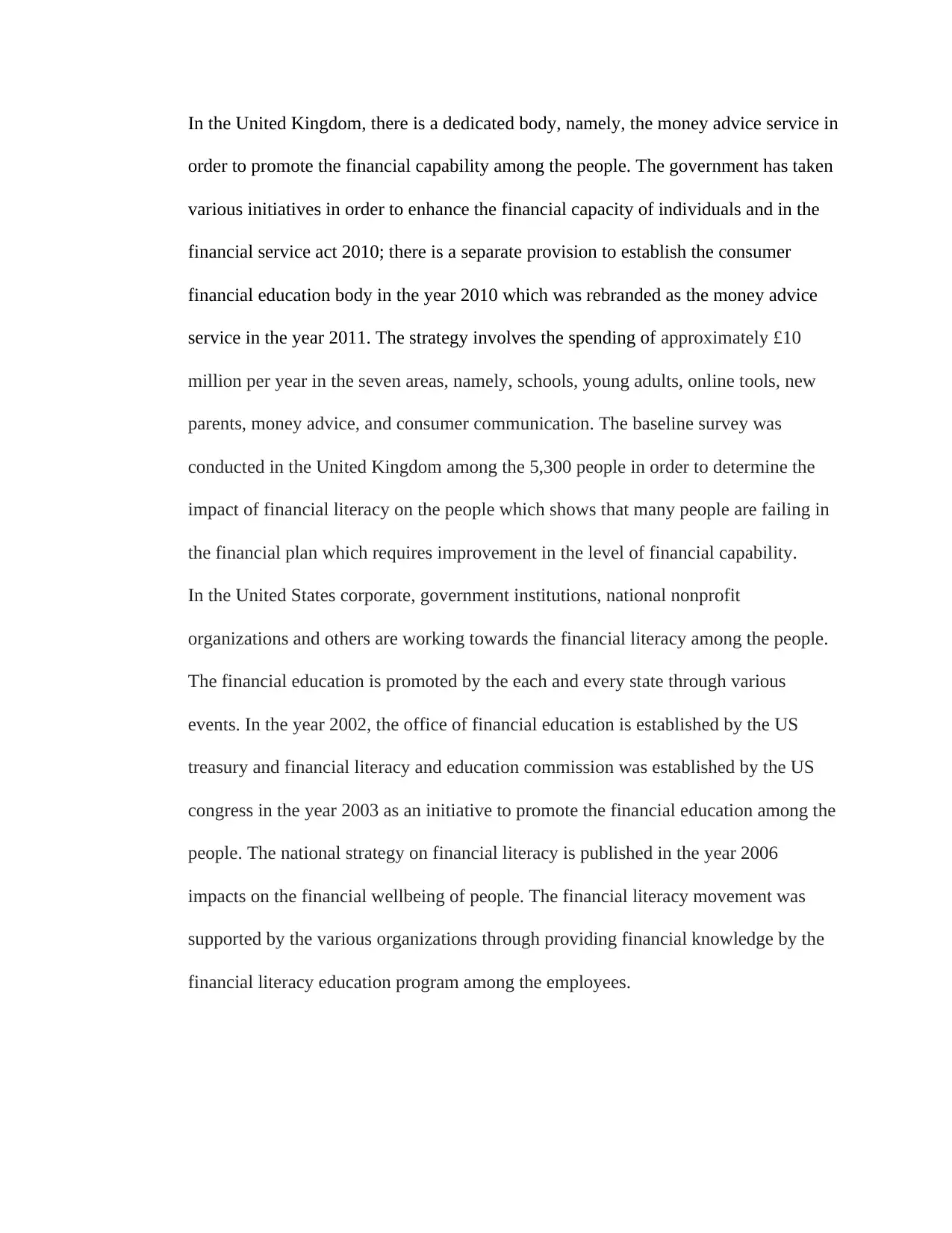
In the United Kingdom, there is a dedicated body, namely, the money advice service in
order to promote the financial capability among the people. The government has taken
various initiatives in order to enhance the financial capacity of individuals and in the
financial service act 2010; there is a separate provision to establish the consumer
financial education body in the year 2010 which was rebranded as the money advice
service in the year 2011. The strategy involves the spending of approximately £10
million per year in the seven areas, namely, schools, young adults, online tools, new
parents, money advice, and consumer communication. The baseline survey was
conducted in the United Kingdom among the 5,300 people in order to determine the
impact of financial literacy on the people which shows that many people are failing in
the financial plan which requires improvement in the level of financial capability.
In the United States corporate, government institutions, national nonprofit
organizations and others are working towards the financial literacy among the people.
The financial education is promoted by the each and every state through various
events. In the year 2002, the office of financial education is established by the US
treasury and financial literacy and education commission was established by the US
congress in the year 2003 as an initiative to promote the financial education among the
people. The national strategy on financial literacy is published in the year 2006
impacts on the financial wellbeing of people. The financial literacy movement was
supported by the various organizations through providing financial knowledge by the
financial literacy education program among the employees.
order to promote the financial capability among the people. The government has taken
various initiatives in order to enhance the financial capacity of individuals and in the
financial service act 2010; there is a separate provision to establish the consumer
financial education body in the year 2010 which was rebranded as the money advice
service in the year 2011. The strategy involves the spending of approximately £10
million per year in the seven areas, namely, schools, young adults, online tools, new
parents, money advice, and consumer communication. The baseline survey was
conducted in the United Kingdom among the 5,300 people in order to determine the
impact of financial literacy on the people which shows that many people are failing in
the financial plan which requires improvement in the level of financial capability.
In the United States corporate, government institutions, national nonprofit
organizations and others are working towards the financial literacy among the people.
The financial education is promoted by the each and every state through various
events. In the year 2002, the office of financial education is established by the US
treasury and financial literacy and education commission was established by the US
congress in the year 2003 as an initiative to promote the financial education among the
people. The national strategy on financial literacy is published in the year 2006
impacts on the financial wellbeing of people. The financial literacy movement was
supported by the various organizations through providing financial knowledge by the
financial literacy education program among the employees.
You're viewing a preview
Unlock full access by subscribing today!
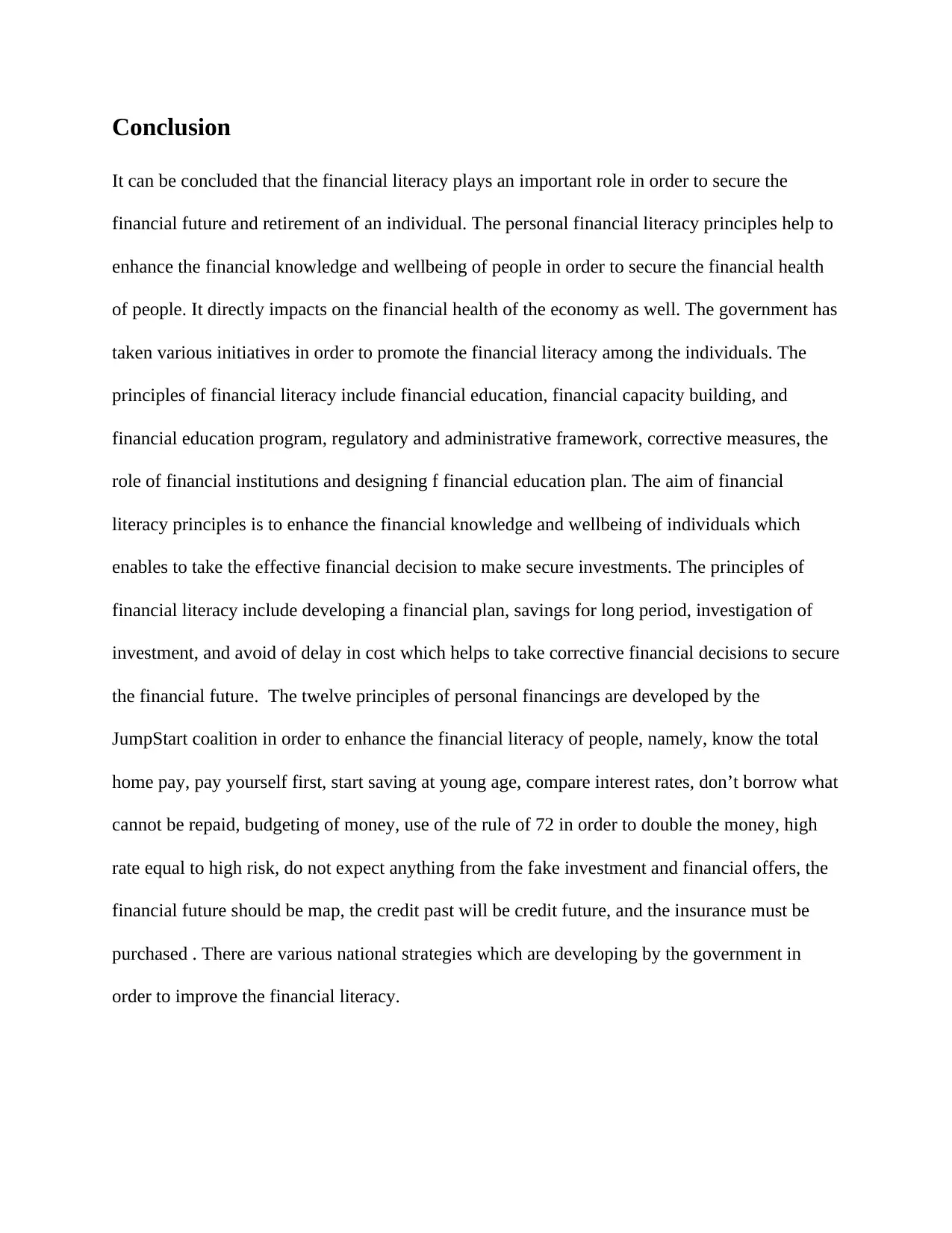
Conclusion
It can be concluded that the financial literacy plays an important role in order to secure the
financial future and retirement of an individual. The personal financial literacy principles help to
enhance the financial knowledge and wellbeing of people in order to secure the financial health
of people. It directly impacts on the financial health of the economy as well. The government has
taken various initiatives in order to promote the financial literacy among the individuals. The
principles of financial literacy include financial education, financial capacity building, and
financial education program, regulatory and administrative framework, corrective measures, the
role of financial institutions and designing f financial education plan. The aim of financial
literacy principles is to enhance the financial knowledge and wellbeing of individuals which
enables to take the effective financial decision to make secure investments. The principles of
financial literacy include developing a financial plan, savings for long period, investigation of
investment, and avoid of delay in cost which helps to take corrective financial decisions to secure
the financial future. The twelve principles of personal financings are developed by the
JumpStart coalition in order to enhance the financial literacy of people, namely, know the total
home pay, pay yourself first, start saving at young age, compare interest rates, don’t borrow what
cannot be repaid, budgeting of money, use of the rule of 72 in order to double the money, high
rate equal to high risk, do not expect anything from the fake investment and financial offers, the
financial future should be map, the credit past will be credit future, and the insurance must be
purchased . There are various national strategies which are developing by the government in
order to improve the financial literacy.
It can be concluded that the financial literacy plays an important role in order to secure the
financial future and retirement of an individual. The personal financial literacy principles help to
enhance the financial knowledge and wellbeing of people in order to secure the financial health
of people. It directly impacts on the financial health of the economy as well. The government has
taken various initiatives in order to promote the financial literacy among the individuals. The
principles of financial literacy include financial education, financial capacity building, and
financial education program, regulatory and administrative framework, corrective measures, the
role of financial institutions and designing f financial education plan. The aim of financial
literacy principles is to enhance the financial knowledge and wellbeing of individuals which
enables to take the effective financial decision to make secure investments. The principles of
financial literacy include developing a financial plan, savings for long period, investigation of
investment, and avoid of delay in cost which helps to take corrective financial decisions to secure
the financial future. The twelve principles of personal financings are developed by the
JumpStart coalition in order to enhance the financial literacy of people, namely, know the total
home pay, pay yourself first, start saving at young age, compare interest rates, don’t borrow what
cannot be repaid, budgeting of money, use of the rule of 72 in order to double the money, high
rate equal to high risk, do not expect anything from the fake investment and financial offers, the
financial future should be map, the credit past will be credit future, and the insurance must be
purchased . There are various national strategies which are developing by the government in
order to improve the financial literacy.
Paraphrase This Document
Need a fresh take? Get an instant paraphrase of this document with our AI Paraphraser
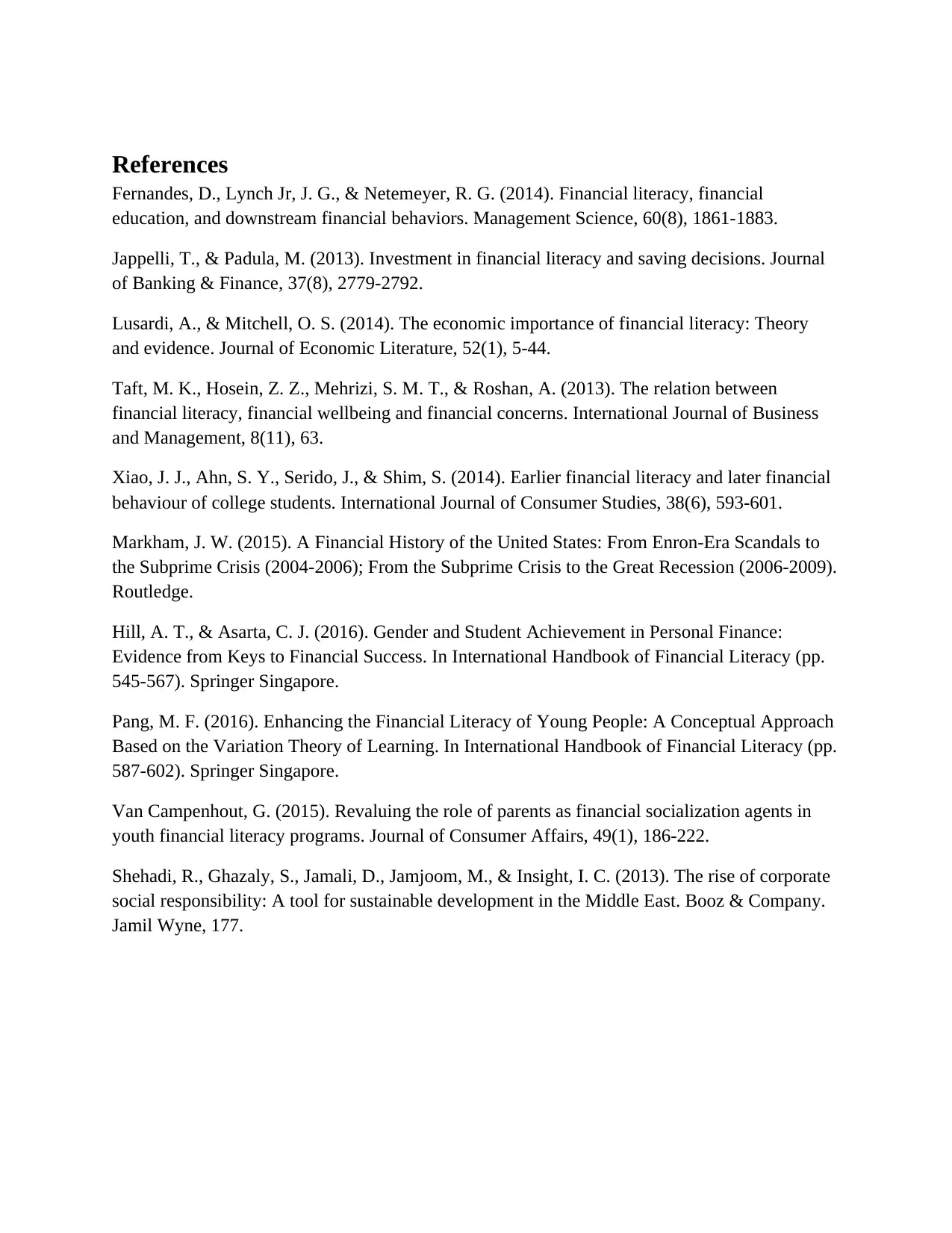
References
Fernandes, D., Lynch Jr, J. G., & Netemeyer, R. G. (2014). Financial literacy, financial
education, and downstream financial behaviors. Management Science, 60(8), 1861-1883.
Jappelli, T., & Padula, M. (2013). Investment in financial literacy and saving decisions. Journal
of Banking & Finance, 37(8), 2779-2792.
Lusardi, A., & Mitchell, O. S. (2014). The economic importance of financial literacy: Theory
and evidence. Journal of Economic Literature, 52(1), 5-44.
Taft, M. K., Hosein, Z. Z., Mehrizi, S. M. T., & Roshan, A. (2013). The relation between
financial literacy, financial wellbeing and financial concerns. International Journal of Business
and Management, 8(11), 63.
Xiao, J. J., Ahn, S. Y., Serido, J., & Shim, S. (2014). Earlier financial literacy and later financial
behaviour of college students. International Journal of Consumer Studies, 38(6), 593-601.
Markham, J. W. (2015). A Financial History of the United States: From Enron-Era Scandals to
the Subprime Crisis (2004-2006); From the Subprime Crisis to the Great Recession (2006-2009).
Routledge.
Hill, A. T., & Asarta, C. J. (2016). Gender and Student Achievement in Personal Finance:
Evidence from Keys to Financial Success. In International Handbook of Financial Literacy (pp.
545-567). Springer Singapore.
Pang, M. F. (2016). Enhancing the Financial Literacy of Young People: A Conceptual Approach
Based on the Variation Theory of Learning. In International Handbook of Financial Literacy (pp.
587-602). Springer Singapore.
Van Campenhout, G. (2015). Revaluing the role of parents as financial socialization agents in
youth financial literacy programs. Journal of Consumer Affairs, 49(1), 186-222.
Shehadi, R., Ghazaly, S., Jamali, D., Jamjoom, M., & Insight, I. C. (2013). The rise of corporate
social responsibility: A tool for sustainable development in the Middle East. Booz & Company.
Jamil Wyne, 177.
Fernandes, D., Lynch Jr, J. G., & Netemeyer, R. G. (2014). Financial literacy, financial
education, and downstream financial behaviors. Management Science, 60(8), 1861-1883.
Jappelli, T., & Padula, M. (2013). Investment in financial literacy and saving decisions. Journal
of Banking & Finance, 37(8), 2779-2792.
Lusardi, A., & Mitchell, O. S. (2014). The economic importance of financial literacy: Theory
and evidence. Journal of Economic Literature, 52(1), 5-44.
Taft, M. K., Hosein, Z. Z., Mehrizi, S. M. T., & Roshan, A. (2013). The relation between
financial literacy, financial wellbeing and financial concerns. International Journal of Business
and Management, 8(11), 63.
Xiao, J. J., Ahn, S. Y., Serido, J., & Shim, S. (2014). Earlier financial literacy and later financial
behaviour of college students. International Journal of Consumer Studies, 38(6), 593-601.
Markham, J. W. (2015). A Financial History of the United States: From Enron-Era Scandals to
the Subprime Crisis (2004-2006); From the Subprime Crisis to the Great Recession (2006-2009).
Routledge.
Hill, A. T., & Asarta, C. J. (2016). Gender and Student Achievement in Personal Finance:
Evidence from Keys to Financial Success. In International Handbook of Financial Literacy (pp.
545-567). Springer Singapore.
Pang, M. F. (2016). Enhancing the Financial Literacy of Young People: A Conceptual Approach
Based on the Variation Theory of Learning. In International Handbook of Financial Literacy (pp.
587-602). Springer Singapore.
Van Campenhout, G. (2015). Revaluing the role of parents as financial socialization agents in
youth financial literacy programs. Journal of Consumer Affairs, 49(1), 186-222.
Shehadi, R., Ghazaly, S., Jamali, D., Jamjoom, M., & Insight, I. C. (2013). The rise of corporate
social responsibility: A tool for sustainable development in the Middle East. Booz & Company.
Jamil Wyne, 177.
1 out of 14
Related Documents
Your All-in-One AI-Powered Toolkit for Academic Success.
+13062052269
info@desklib.com
Available 24*7 on WhatsApp / Email
![[object Object]](/_next/static/media/star-bottom.7253800d.svg)
Unlock your academic potential
© 2024 | Zucol Services PVT LTD | All rights reserved.





